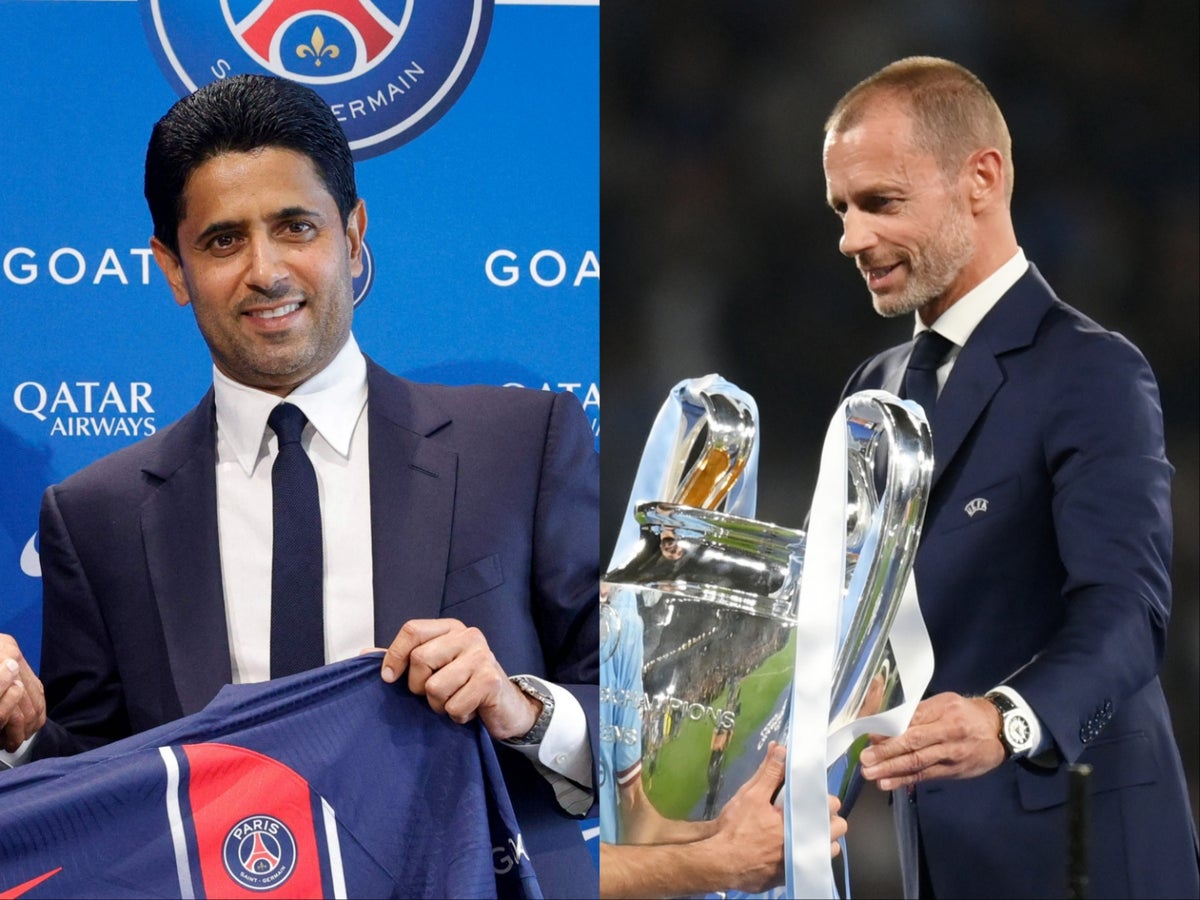
It is a story that is creating a growing anger off the pitch, that many involved see as increasingly dictating what happens on the pitch.
In the last few days, one club who had recently joined the new Union of European Clubs [UEC] – set up for those clubs who do not feel their interests are sufficiently represented at the top level – suddenly received a letter from a much more prominent organisation. The European Club Association [ECA], the elite body of clubs currently headed by Paris Saint-Germain chairman Nasser Al-Khelaifi, told them that recent qualifications ensured they had now met the requirements to be an Associated Member for the new cycle of 2023-27.
The letter also read: “Please note that ECA membership is subject to adherence at all times to the ECA Statutes. For your ease of reference, you will find enclosed a copy of Articles 2 and 8 of the ECA Statutes, which detail ECA’s objectives and its members’ obligations (including the incompatibility of simultaneous membership of another representative body).”
In other words, and following on from the circular announcing the new cycle stressing the same point, they cannot be members of both the ECA and UEC.
The former would insist that this is just a matter of protocol, and it is not the case that clubs get “kicked out”. The argument is that the club themselves would make the decision.
“ECA membership is voluntary,” a spokesperson for the body said, “but sole membership is fundamental to achieving our goals. If a club wants to join a group like A22, UEC or whoever is next, they will not be able to be a member of the ECA.”
PSG chairman Nasser Al-Khelaifi heads up the European Club Association [ECA]— (AFP via Getty Images)
Those in the UEC have a very different interpretation. Dennis Gudasic, one of the union’s co-founders, says “what they really mean when they use this language is to continue with the current process of kidnapping and hijacking European football from Uefa”. That is admittedly a view that goes way beyond the UEC, but was part of the reason why it was established. Of the 245 ECA members in the last cycle, only 109 had full voting rights. That will go to 140 in this cycle. Only the 16 founders, however, have permanent status. That has led to a long-held feeling that this has allowed a narrowing group of clubs, inevitably led by the biggest, to exert a pervasive influence on the game. It is why it has at least attracted the sympathy of Premier League clubs such as Aston Villa, Brentford, Brighton and Crystal Palace.
There are many in football who would put every major issue in the game – from the predictability of the Champions League and so many domestic leagues to the very reason clubs grow to such a financial size that autocratic states want to buy them – squarely at the feet of the ECA. They do currently have an unprecedented influence. The ECA now have a memorandum of understanding with Uefa that means they recognise the governing body as the sole institution running European football and Uefa in turn recognise them as the sole representative of clubs.
“The ECA letter in fact projects the following message: ECA is running the show in European football, not Uefa,” Gudasic, who is also the chief executive of Lokomotiva Zagreb, says.
The ECA would argue that the point of their body is that clubs need to be represented when they get to European level, and it is as much about mid-level clubs getting what they are due as the supposed “elite”. They would also point to how Uefa themselves now say that clubs cannot simultaneously be a member of other organisations, as much because those who have not qualified for continental competition are supposed to be represented by the European Leagues body.
Uefa are having European football ‘kidnapped and hijacked’ from them, according to some— (AP)
This stance is totally rejected by the UEC, on the grounds that they have a “very close relationship” with the European Leagues, principally since they are a body representing – the source’s emphasis –“leagues”. There’s “no overlapping of interests” since the UEC was developed out of the European Leagues’ Club Advisory Platform initiative, and on the back of the body’s support.
They would also point to the huge number of clubs from all over Europe that want to join the UEC, but are now fearful because of the ECA’s response.
“ECA speak only about ‘commercial aspects of the competitions’, ‘how many packages can be sold’, the ‘strengthening of ECA’s joint venture with UEFA’” Gudasic says. “What they really mean when they use this language is to continue with the current process of kidnapping and hijacking European football from Uefa. That’s the real plan and there is a real danger they will achieve this plan by the 2027 cycle. This is not what football fans in Europe want to see happening. That’s why the UEC is so important. It’s the only counterbalance to these plans.”
One feeling within football is that it’s an “unnecessary war” by the ECA.
“They were never meant to represent the likes of Burnley, Almeria or Duisburg,” an involved figure says. “The ECA are the voice of clubs that play regularly in European competitions.”
If it’s a war, only one front has been opened. The main effects will be seen on the pitch.





